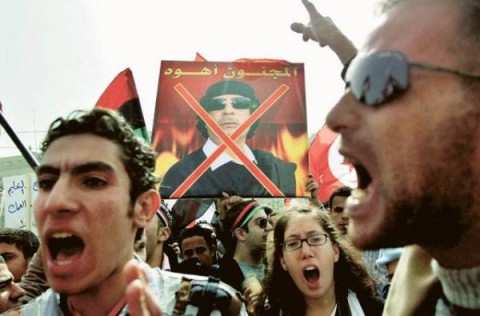Great change is in the cards for Libya in the wake of the eight-month Libyan Civil War, which culminated in the death of Muammar al-Qaddafi and the end of his forty-plus-years dictatorial reign on October 20. Many questions still remain about the conflict itself and where the Libyan people are to navigate from here on.
Despite the obvious absence of Qaddafi as a direct threat to the Libyan people, it does not necessarily indicate that Qaddafi as a leader is now out of the minds of the majority of the population. Pro-Qaddafi loyalists still exist in Libya and in bordering states and threaten Libya’s quest for stability. Though it is hard to imagine that this threat is long-term, it must be noted that continued fighting will make it much harder for Libyan leaders to establish peace and maintain order, especially considering that even without Qaddafi loyalists, Libya is a highly factionalized state. One of the biggest questions coming from foreign analysts and within Libya itself is whether a unified state with a majority-supported leader is even an attainable short-term goal.
Translating regional militia leadership united against Qaddafi into a government brought together for the good of Libya will be no small order. Will individuals be able to put down arms and practice democratic statecraft? It’s hard to know at this point in time.
Despite questions over Libyan stability and shock over the moral ambiguity of Qaddafi’s death as the defining moment of the new Libya, foreign investors and businessmen are increasingly eager to settle down in a cozy office building in Tripoli, Benghazi or Misurata for the long haul. While nation building is reliant on economic support, the question remains over whether monetary influx will help Libya more than it will further the divides and increase the instability. Sitting on Africa’s largest oil reserve, Libya finds itself in a desirable position for the future, but it cannot be forgotten that oil is a commodity veritably tied to conflict, especially in the Middle East.
Questions about Libya are endless and most are unanswerable, especially to someone who is not an expert on the country (such as myself). I must admit that before the Arab Spring conflicts broke out almost a year ago I knew little about Muammar al-Qaddafi, Libya and the problems that existed there. While today I know much more— having spent months reading articles, watching the news and keeping up to date with developments even as they played out in real-time— I still do not claim to have the answers. I can’t say what course of action will be the savior for Libya.
The Arab Spring events may not live up to the events witnessed by my grandparents and great-grandparents in terms of historical magnitude, but in terms of energy they have nonetheless been awe-inspiring. The Arab Spring has demonstrated what has not been so easily seen in America during my lifetime. The practice of democratic ideals is dependent on allowing people to exercise their political frustrations. It is the will of the people as a whole and the consent they give that ultimately decides what actions are acceptable and unacceptable. Although it may take great time and energy, and in some cases blood, the will of the people cannot be suppressed permanently by any course of action that deems itself greater than the will of the majority.
While these lessons and others congruent to them are ever present in the overarching congress of American idealism, the direct correspondence of these democratic ideals to real-world events has made them more tangible to me than ever in the wake of the revolts in the Arab Spring, and to the greatest degree in the Libyan Civil War. And while the fact of the matter may indeed still be that the future of Libya is dependent on a number of questions far more important than questions of represented idealism, it is my opinion that these questions mustn’t be overlooked, neither in Libya nor in other parts of the world. Idealism is the belief in the possibility of a better existence. While this belief is nothing without action, the events in Libya have demonstrated that with action and idealism, a better existence is not out of reach for any group of people in any part of the world. •












He could have accepted an offer of a comfortable retirement. He chose loyalty to his country and his people. He tried to save libya from those that you see want a cozy little office. After all, its not their oil. No Libyans were homeless. He built new apartment complexes one after the other. No charge. No rent. No electricity bills. Free healthcare, free education, $50,000 wedding gift to newlyweds. A good man. A beutal defender of the average citizen’s lifestyle. Western media ridiculed his assertion that Al Qaeda was involved in this so called ‘revolution’. Everything about it stinks, especially the president and his cronies.
Arab Spring was a “buzz phrase” created by America and NATO to overthrow a few middle eastern regimes that weren’t bending over for them, and had some spare cash/oil sitting around to steal. The protests in Middle East are all about the younger generation in Libya looking over the fence at US & Europe, seeing them live live millionaires. Not knowing that they were living on “borrowed” money – with economies on the verge of collapse. Similar to what is happening in These middle east protests would have long been stifled if it hadn’t been for NATO’s interference, for their own nefarious reasons of course. “Wow the goverments and corps say, just by coincidance the country we saved from the evil dictator has tons of financial opportunities” similar to the %995
Gaddhafi was a great man for Libya, and the entire continent of Africa – his recent proposed Wealth Distribution Plan (which Jamil w/ help of France were trying to stop!) would have distributed ALL of Libya’s oil revenues fairly to ALL Libya tribes! He bankrolled Nelson Mandelya’s fight against apartheid. He built the biggest Water Well/Pipeline System in history, transforming the Sahara desert into farmland that Libyan’s, Sudanese, Nigerians, and Chads could use to feed themselves (instead of starving to death while waiting for “colonialism” handouts).
[…] el-Qaddafi's former compound in Tripoli, where people come to view the rui more… Lessons from Libya: A Crash Course in Idealism – The Connecticut College Voice – thecollegevoice.org 11/08/2011 Lessons from Libya: A Crash Course in IdealismThe […]